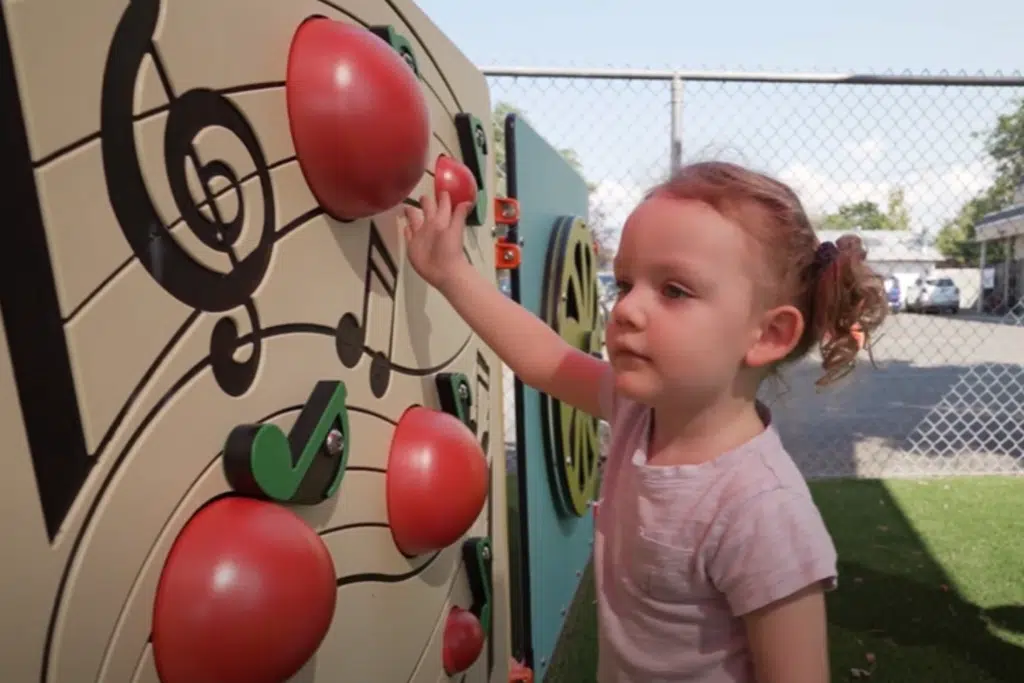Celebrating Autism Acceptance Month this April
“Thank you, mama.”
That sentence could make any mom smile. But it’s an even bigger milestone for three-year-old Skylar, who stopped speaking for nearly two years.
Her parents, Kassandra and Jamie, are now discovering just how much knowledge Skylar picked up during that time. “Colours, numbers, all this information she was absorbing during the whole time she wasn’t able to talk to us,” Kassandra says.
When Skylar was very young, she seemed to be developing at the same pace as other children her age, but then she stopped speaking. She often didn’t respond when her parents tried to get her attention and they noticed repetitive movements, such as spinning or shaking her head.
Due to these concerns, Skylar started attending Starbright Children’s Developmental Centre in Kelowna when she was about one and a half. Staff at the centre suggested Skylar get an early autism assessment.
With Variety’s support, Skylar received a private assessment, leading to a diagnosis of autism and global developmental delay. This discovery not only helps Skylar’s family better understand and communicate with her, but it also means she’s eligible for crucial government funding for therapies.
If you’ve only recently discovered your child’s diagnosis, know you’re not alone. There are a lot of frightening unknowns. But there is support, too.
As we celebrate Autism Acceptance Month this April, it’s an opportunity to learn more about autism and push for greater acceptance and support for kids with autism and their families.
So, what is autism?
Just like so many other aspects of life, autism is a wide spectrum. Each autistic person’s experiences, strengths, and challenges are distinct.
Autism is a neurodevelopmental condition characterized by differences in communication, social interaction, and repetitive behaviours. Some common characteristics include highly focused interests; challenges with verbal or nonverbal communication; exceptional strengths in areas like memory, attention to detail or pattern recognition; difficulty understanding social cues; sensory sensitivities; a strong preference for routines.
Clinical psychologist and author Megan Anna Neff, who discovered she had autism in her 30s, writes that families can foster acceptance by “creating a safe and supportive home environment that allows for sensory regulation, neurodivergent communication, and connection.”
As well as more obvious tips like being aware of sensory needs, supporting your child’s interests, and creating a predictable routine, Megan encourages parents to be curious. Learning about different types of neurodiversity (including potentially your own!) can be eye-opening and empowering – helping you feel more equipped as a parent as well as more able to meet your child where they are.
Supporting kids with autism
Finding the right support can make a significant difference in your child’s development and quality of life. It can also be really overwhelming. Autism BC has many helpful resources about what to consider when seeking the right care for your child.
We also know that accessing assessments and therapies can be expensive. That’s where Variety steps in. We offer financial assistance to families for private autism assessments for children aged four and under as well as specialized therapies for children under 19. This enables families to receive timely diagnoses and early interventions.
If you feel uncertain as you begin trying to understand your child’s neurodivergence, know you’re not alone. And as your child’s biggest advocate and fan, take pride in your unique role in shaping their confidence and sense of self.
“There’s always a lot of stigma around autism and other non-neurotypical conditions,” says Skylar’s mom, Kassandra. “The best thing a parent can do is say, ‘You know what? This doesn’t change my child being an incredible kid, but let’s figure out what they need.’”
